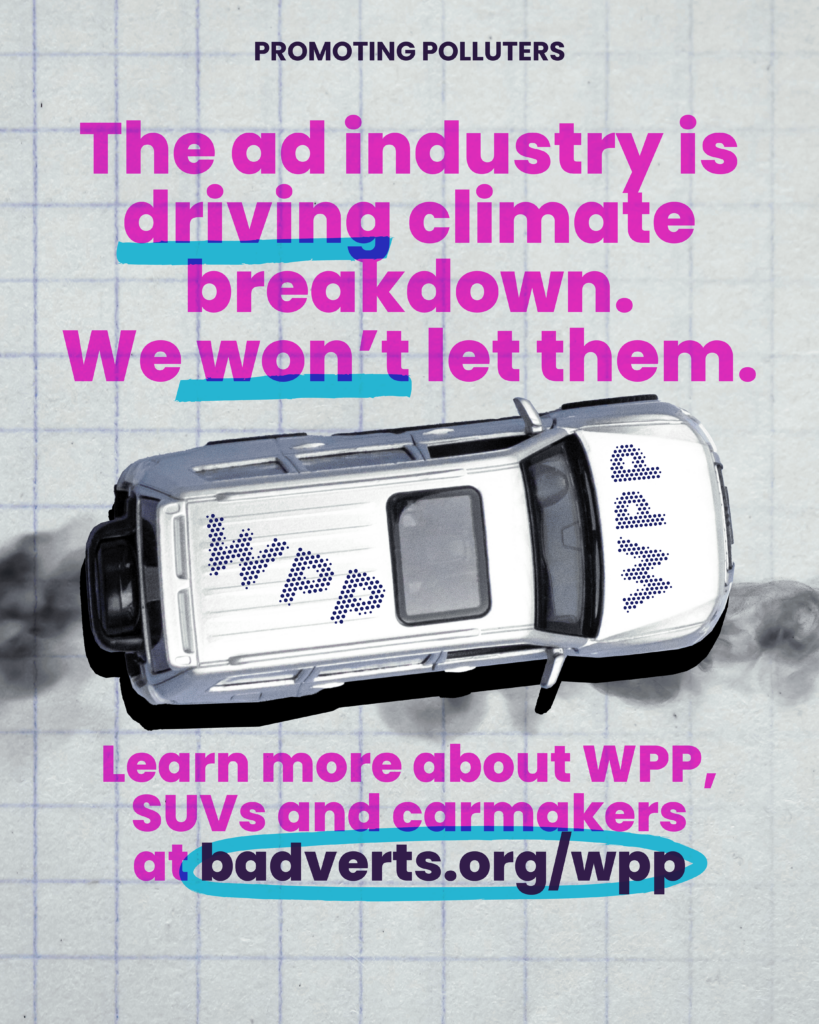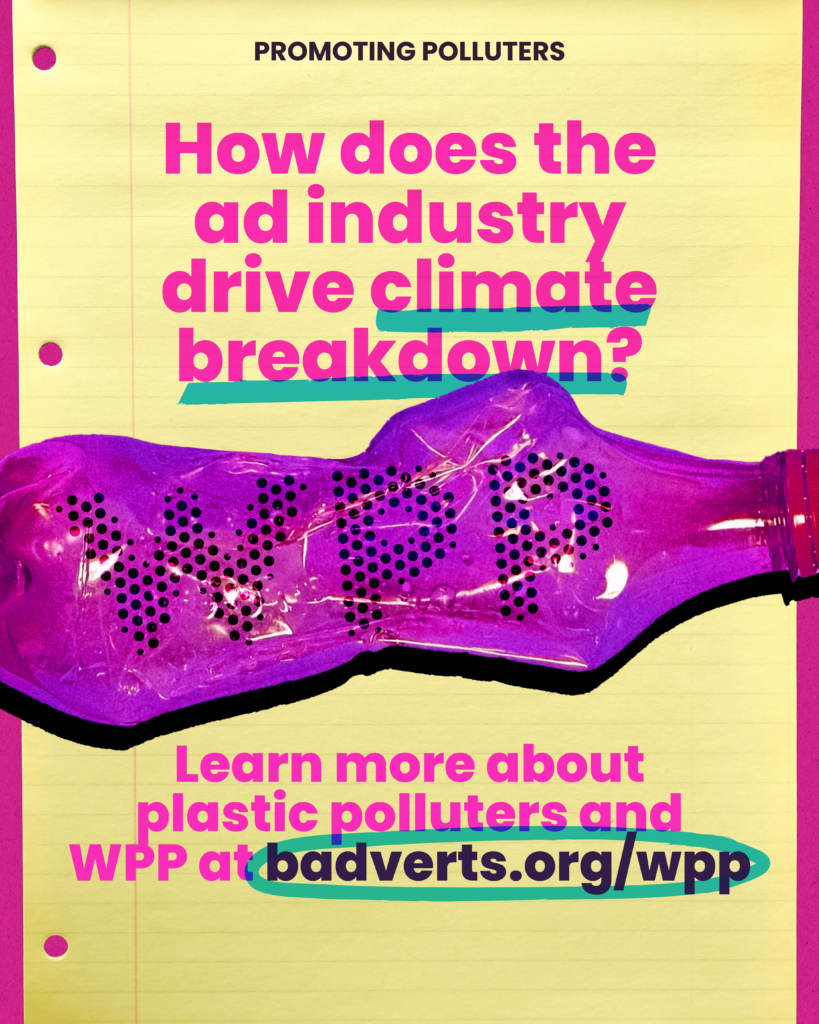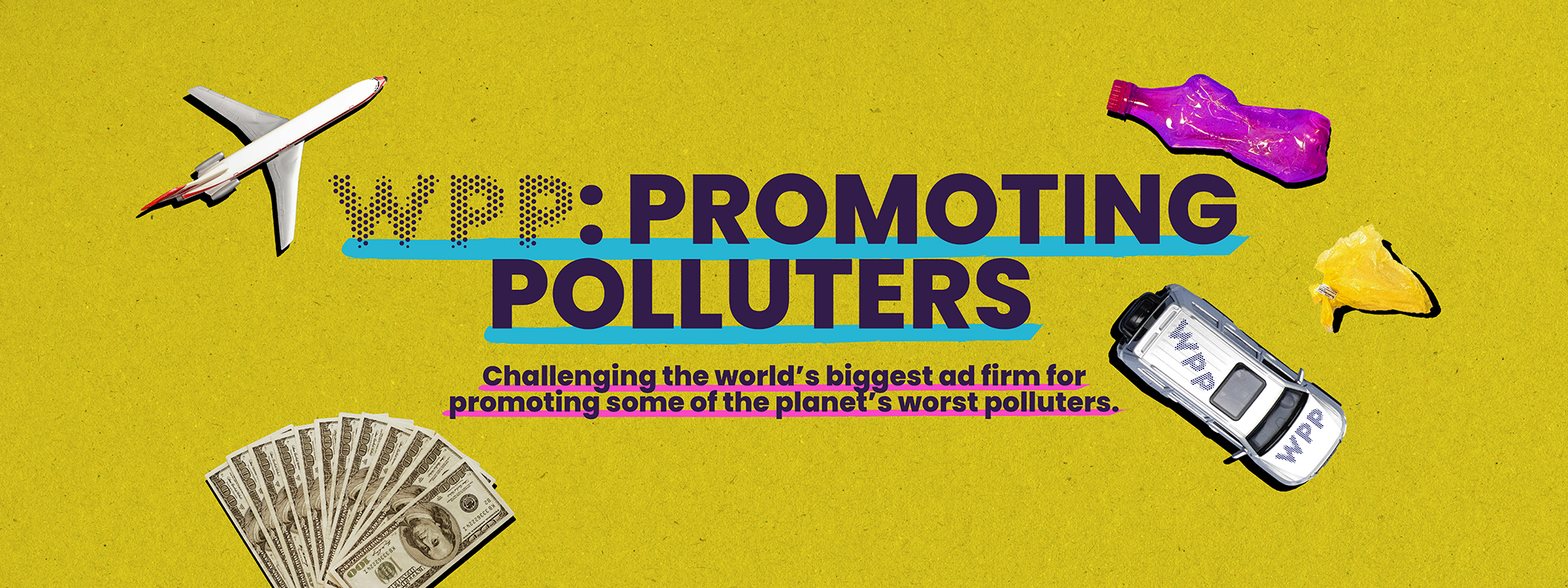In a first-of-its-kind action, we’ve reported the world’s largest ad firm, WPP, to the international watchdog on corporate responsibility for breaking rules on climate and human rights and the impacts that result.
Alongside Adfree Cities, we’ve reported WPP to the Organisation for Economic Cooperation and Development (OECD) over the ad company’s work for heavily polluting clients, including fossil fuel companies, massive plastic polluters, airlines, SUV manufacturers and the banks that fund fossil fuels. The complaint alleges that WPP’s work for clients including Shell, BP, Toyota, HSBC, JPMorgan Chase and CocaCola “directly increases demand for carbon-intensive products and undermines global efforts to reduce greenhouse gas emissions”, and is in breach of the OECD’s international guidelines for corporate responsibility.
The Guidelines are government-backed voluntary standards for OECD countries to promote responsible business conduct by multinational companies. They are considered the most comprehensive set of obligations on business conduct available today, which makes WPP’s alleged breaches a potentially significant moment in corporate governance.
We argue that WPP, which owns agencies including Ogilvy and VML, has failed to meet the guidelines’ requirements for corporations to act sustainably and responsibly, due to “the climate, environmental and human rights impacts facilitated through its advertising services”, as well as being in breach of pledges made by WPP itself. Climate breakdown threatens a range of human rights, including to health, life, water and sanitation and food.
According to WPP’s 2023 Annual Report, the company’s policy “is not to take on any client work, including lobbying, designed to frustrate the objectives of the Paris Agreement”. However, the complaint outlines the inconsistency between this statement and WPP’s work to promote polluters; and adds that working for such clients opens WPP to the risk of greenwashing.
Andrew Simms, co-director of the New Weather Institute, said:
“You cannot make climate pledges, and still promote the world’s most polluting companies. Advertisers may be skilled at creating alternative realities, but in believing it can do both WPP has fallen for its own illusion, breaking its own rules and multinational guidelines. WPP’s oil company clients have publicly ripped up green promises, so to say they’re helping them do better is either disingenuous or self-deluding.”
“Advertisers are working on briefs that deliberately target young people, politicians and consumers with misleading ads and pro-polluter messages. Every wildfire and extreme weather event is a reminder that we are in an age of climate consequences. For those irresponsible enough to actively promote pollution, the consequences are likely to be increasingly legal.”

Research in 2022 found that the UK advertising industry added 32% to the annual carbon footprint of every UK citizen through the emissions associated with the extra consumption of goods and services driven by advertising, also called ‘advertised emissions’. WPP has acknowledged that its work has an impact on the environment through influencing people’s way of living, saying “we recognise that our greatest contribution to the planet is through our work, which can shift attitudes and change behaviours to build a sustainable future and a more inclusive society.”
Yet WPP’s client list doesn’t reflect this sustainable future: including a lengthy list of airlines, such as British Airways and United Airlines, and heavily polluting carmakers, including an 80-year relationship with Ford. Advertising has helped to increase demand for larger, heavier and more polluting SUVs, which were responsible for over 20% of the growth in global energy-related CO2 emissions in 2023. Similarly, despite experts warning that plastics pose a ‘critical human health crisis, WPP successfully pitched for the $4 billion CocaCola marketing account in 2021. CocaCola is the world’s worst plastics polluter, responsible for 11% of branded plastic pollution worldwide.
Dr Veronica Wignall, co-director at Adfree Cities, said:
“It’s been said that advertisers are the architects of desire. I look around and see ads everywhere for SUVs, plastic polluter giants and long distance flights, in between newsreels of climate disasters and nature loss. It is now both morally unforgivable and a legal risk to do promotional work for toxic brands like Shell and Coke. WPP is currently working against the greener, fairer future the world urgently needs; we’re calling on WPP to live up to its climate pledges and stop promoting polluters.”
Advertising firms have not yet faced litigation on climate grounds, unlike many of their carbon-intensive clients. Margherita Cornaglia and Harj Narulla, Barristers at Doughty Street Chambers, co-wrote the complaint.
According to Harj Narulla:
“This complaint to the OECD NCP marks a step-change in legal risk for advertisers working to facilitate fossil fuel companies and other major polluters. Our complaint clearly shows that by representing high-emitting clients, WPP is in breach of its human rights, climate and environmental duties under the OECD Guidelines. WPP must disengage from these clients and start meeting its due diligence and disclosure obligations.”
Investors at WPP also warn that the legal and reputational risks of ad companies’ fossil fuel client work is becoming unsustainable.

Other adverts created by WPP agencies include:
- A Shell ‘Cleaner Energy’ advert made by WPP agency Wunderman Thompson (now VML), which was banned by the ASA in 2023 for misleading consumers by failing to mention Shell’s large scale fossil fuel operations and emissions. A second ‘Powering Progress’ Shell ad by VML, which portrays Shell as investing in the energy transition, is currently under investigation by the ASA.
- WPP’s agency Ogilvy has worked with BP for more than two decades, helping to curate an image of environmental responsibility through a full rebrand, reputation management, advertising campaigns and sponsorships. In 2020, a leaked briefing from BP to WPP agencies stated BP’s strategy to “invest in more oil and gas” before asking the agencies to position the oil major as a leader in the clean energy transition.
- Ogilvy Government Relations (OGR), has “repeatedly engaged in work designed to frustrate the goals of the Paris Agreement” through its work for the American Petroleum Institute (API), including lobbying for API against methane regulation and a windfall tax on oil companies.
The complaint asks WPP to take certain steps, including: disclosing the environmental impacts of its work, including its ‘advertised emissions’, implementing meaningful due diligence processes and aligning its operations with internationally recognised climate and human rights standards. The complaint further asks that if WPP does not take these steps, the company should be officially found to be in breach of the OECD Guidelines.
Andreas von Angerer, Head of Impact at sustainable investment firm Inyova, which leads a group of investors engaging WPP, said: “Since 2023, we have been urging PR and advertising firms to address the legal and reputational risks of working for high-carbon clients. The OECD complaint against WPP is a stark example of how quickly these risks are materialising.”














